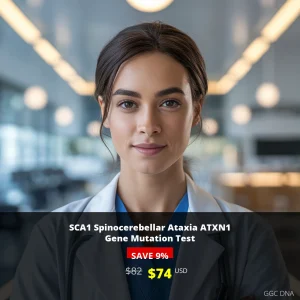Next Generation Sequencing Familial Hemiplegic Migraine Test
Understanding Familial Hemiplegic Migraine Genetic Testing
Familial Hemiplegic Migraine (FHM) represents a rare and complex neurological disorder characterized by severe migraine attacks accompanied by temporary paralysis or weakness on one side of the body. Our Next Generation Sequencing Familial Hemiplegic Migraine Test provides comprehensive genetic analysis to identify mutations in key genes associated with this condition, offering crucial insights for accurate diagnosis and personalized treatment approaches.
What This Advanced Genetic Test Measures
This sophisticated molecular diagnostic test utilizes cutting-edge Next Generation Sequencing technology to analyze four critical genes known to be associated with familial hemiplegic migraine:
- ATP1A2 Gene: Encodes sodium-potassium ATPase pump subunits crucial for maintaining proper ion balance in brain cells
- CACNA1A Gene: Responsible for calcium channel function in neuronal communication
- PRRT2 Gene: Involved in neurotransmitter release and synaptic function regulation
- SCN1A Gene: Controls sodium channel activity essential for proper nerve signal transmission
The test employs both NGS and Sanger sequencing methodologies to ensure comprehensive coverage and accurate detection of genetic variants that may contribute to migraine susceptibility and severity.
Who Should Consider This Genetic Testing?
Clinical Indications and Symptoms
This specialized genetic test is particularly recommended for individuals experiencing:
- Recurrent migraine attacks with temporary paralysis or weakness on one side of the body
- Family history of hemiplegic migraine or similar neurological conditions
- Atypical migraine symptoms that don’t respond to conventional treatments
- Migraine episodes accompanied by visual disturbances, speech difficulties, or sensory changes
- Early-onset migraine disorders with complex neurological manifestations
- Unexplained neurological symptoms that may indicate genetic migraine syndromes
Comprehensive Benefits of Genetic Testing
Advantages for Patients and Healthcare Providers
Undergoing the Next Generation Sequencing Familial Hemiplegic Migraine Test offers numerous significant benefits:
- Accurate Diagnosis: Provides definitive genetic confirmation of familial hemiplegic migraine, eliminating diagnostic uncertainty
- Personalized Treatment: Enables healthcare providers to develop targeted treatment strategies based on specific genetic findings
- Family Planning Guidance: Offers valuable information for genetic counseling and family planning decisions
- Proactive Management: Helps identify potential triggers and develop preventive strategies for migraine episodes
- Comprehensive Understanding: Provides insights into the underlying mechanisms of migraine disorders
- Research Contribution: Contributes to ongoing research and understanding of genetic migraine conditions
Understanding Your Test Results
Interpreting Genetic Findings
Our comprehensive genetic analysis provides detailed information about your test results:
- Positive Result: Indicates the presence of known pathogenic variants associated with familial hemiplegic migraine, confirming the genetic basis of your condition
- Negative Result: Suggests that no known pathogenic variants were detected in the analyzed genes, though other genetic or environmental factors may still contribute to symptoms
- Variant of Uncertain Significance: Identifies genetic changes whose clinical significance is not yet fully understood, requiring further evaluation and monitoring
- Carrier Status: May reveal information about genetic variants that could affect family members
All results are accompanied by detailed interpretation and guidance from our team of genetic specialists and neurologists.
Test Pricing and Availability
| Price Type | Amount (USD) |
|---|---|
| Discount Price | $586 |
| Regular Price | $650 |
Testing Process and Timeline
Our testing process is designed for convenience and accuracy:
- Sample Collection: 10 mL (5 mL minimum) whole blood from 2 Lavender Top (EDTA) tubes
- Shipping Instructions: Ship refrigerated – DO NOT FREEZE
- Required Documentation: Duly filled Whole Exome Sequencing Consent Form (Form 37)
- Turnaround Time: Samples accepted daily by 9 am; Reports delivered within 40 working days
Nationwide Accessibility
We proudly serve patients across the United States with convenient testing locations in all major metropolitan areas including New York, Los Angeles, Chicago, Houston, Phoenix, Philadelphia, San Antonio, San Diego, Dallas, San Jose, Austin, Jacksonville, Fort Worth, Columbus, Charlotte, San Francisco, Indianapolis, Seattle, Denver, Washington DC, Boston, El Paso, Nashville, Detroit, Oklahoma City, Portland, Las Vegas, Memphis, Louisville, Baltimore, and Milwaukee.
Take Control of Your Neurological Health
Understanding the genetic basis of your migraine condition can be transformative for your treatment journey. Our Next Generation Sequencing Familial Hemiplegic Migraine Test provides the comprehensive genetic insights needed to make informed decisions about your neurological health.
Ready to begin your genetic testing journey? Contact our specialized team today to schedule your test or discuss your options with our genetic counselors.
Call or WhatsApp: +1(267) 388-9828
Our dedicated team of genetic specialists and neurologists is available to answer your questions, provide guidance on the testing process, and help you understand how genetic testing can benefit your specific situation. Take the first step toward personalized migraine management today.






